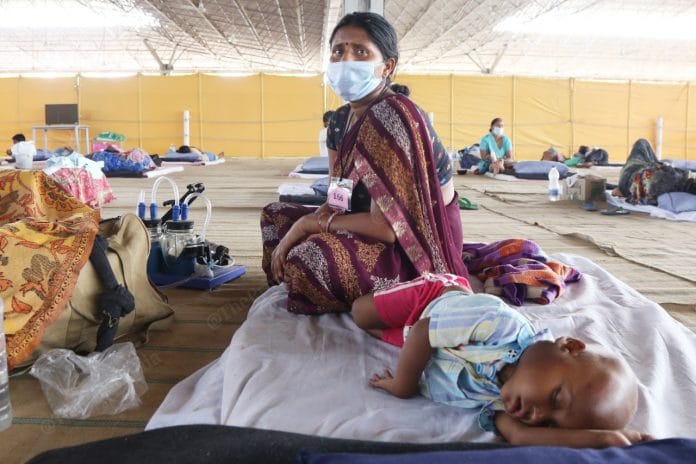Globally, social norms purport that women shoulder a series of responsibilities in the domestic sphere that includes tending to the diverse needs of children, elderly and ill, and simultaneously deal with a load of household chores.
The allocation of time to various unpaid care activities varies across gender. Men in Asia and the Pacific perform the lowest share of unpaid care work among all regions. In India, men barely spend 29 minutes (in urban) and 32 minutes (in rural areas) on care work. In contrast, women in India spend 312 minutes/day in urban areas and 291 minutes/day in rural areas on unpaid care work.
A study conducted by the Centre for Policy Research in 10 urban slums in Bhubaneswar reveals that in 79 per cent of households, women fetch water. In 69 per cent of households, they are responsible for solid waste disposal, in 68 per cent of households women clean individual household latrine, and in 82 per cent of households, they take care of the ill.
Also read: Let’s talk about men — the new vulnerable group in Covid-19 times
Gender inequities more visible during pandemics
Previous studies of emergencies, including infectious disease outbreaks such as the Ebola and Zika crisis, reveal that gender inequities during disasters and pandemics are often more pronounced. Women provide the bulk of care to the ill, and this increases their risk of infection, placing enormous financial, social and psychological burden on them.
Research from Liberia shows that women care providers continue to suffer from the psychological trauma for solely being responsible for those infected with Ebola. This stress is also coupled with the fear of contracting the virus and passing it to their children.
The outbreak of Covid-19 has intensified gender inequity in workload related to ‘care roles’ during the lockdown. The situation has necessitated the closure of schools. 188 countries have announced country-wide school closure to limit both spread and risk of Covid-19. This has resulted in an increased burden for women to care for children.
Also read: Covid-19 will worsen women’s health, income inequality
Menstrual hygiene needs priority
Often during emergencies and disasters, menstrual hygiene management (MHM) is not given due attention. For instance, in China, during the outbreak of Covid, women doctors faced difficulties in ensuring safe MHM due to an acute shortage of sanitary products.
In India too, adolescent girls and women from migrant groups faced tremendous difficulties managing periods while living in quarantine facilities. Given that the lockdown has now been extended, availability of sanitary products might be affected by factors like taboo around menstruation, store closures, delay in delivery, stock-outs.
Also read: Zero Discrimination Day 2020: Promoting empowerment for women in all their diversity
Maintaining social distancing a challenge
The chances of spread of disease are high in dense informal settlements in India, which are inhabited by 65 million migrants (intrastate and interstate), workers and other urban poor. Post-Covid-19, the vulnerability of slum dwellers has increased.
In many urban informal settlements, they rely on common resources (common water collection points, community toilet and public toilet) for water and sanitation (WATSAN). This makes it difficult for them to observe precautionary and preventive measures like social distancing or even ensure the recommended standards of hand-hygiene, leading to an increased probability of disease contraction.
Frequently washing and sanitising hands also increases water dependency. Rapid urbanisation has affected both water quality (pollution of rivers and groundwater) and quantity (as conflicting/competing demands for water increase).
According to a recent report of NITI Aayog, by 2020-21 major cities, including Delhi, Bengaluru, and Hyderabad, are likely to reach zero groundwater levels. This is likely to exacerbate the situation and add to the burden of fetching water on women.
Moreover, during disease outbreaks, it is common to witness limited access to women to much needed maternal health services as only essential medical needs are met. Water, sanitation and hygiene (WASH) infrastructures are often insufficient to meet increased demand during public health emergencies.
Also, those involved in delivery of WASH services, may be reallocated to respond to the health emergency, reducing a population’s access to safe water for cleaning or drinking at a time when good hygiene and sanitation practices are most critical.
Pre-existing gender inequality leaves women and girls particularly vulnerable in such crisis, increasing their care burden. Therefore, it becomes pertinent to develop a gendered strategy to cater to specific needs of essential WATSAN utilities in dense informal settlements.
Also read: Feminism hasn’t sold-out, it’s only using corporate spaces to mobilise support
Need gender responsive strategies
Given that over 200 countries are affected by the spread of Covid-19, these inequities are likely to widen. Currently, to combat the ongoing public health crisis, most strategies focus on scientific and technical solutions crucial to contain the outbreak. However, given that such disease outbreaks deepen gender inequities, there is a need to simultaneously develop gender-responsive strategies to strengthen public health preparedness and response measures which do not de-prioritise women’s health needs.
Care burden roles need to be shared by both men and women in the family, not just during emergencies but also in normal times. This would require gender transformative policies and programmes for institutions, including families to adopt and adapt.
Crisis management programmes for local communities, including elected representatives through gendered lens should be institutionalised, covering social, mental, psychological, economic and health-related aspects. Responses based on gender analysis aiming to mitigate the social and economic impacts of Covid-19 are critical for developing a resilient strategy that leads to sustainable outcomes.
Anju Dwivedi is a senior researcher and Tripti Singh is a research associate at the Scaling City Institution for India (SCI-FI) nested at the Centre for Policy Research (CPR), New Delhi. Views are personal.
This article is a part of ThePrint-CPR series based on Scaling City Institutions for India’s (SCI-FI) research on water and sanitation. Read all the articles in the series here.






